I was confused when I first moved to England about use of the term “corn” – which to North Americans means the yellow kernels that brighten every summer picnic. In England it’s used in its traditional and more wide-ranging sense, meaning any grain, and generally the kind that feeds livestock. According to Michael Pollan, it used to mean literally any grain at all – including grains of salt, hence the expression “corned beef”. And hence the qualifier “sweet” which is added to the kind of corn that people eat, as in sweetcorn.
While passing through London in November, on my way to Italy, I happened on a copy of his recently published and much-praised book, The Omnivore’s Dilemma, right there in the Bloomsbury Oxfam Bookshop. Delighted I was, but long in the opening of this fascinating story. I have started reading it this week, after coming upon an interview with him recorded a few months before the book hit the shelves. The interview is more about Pollan and his research and writing methods than the content of the book, but he does preface the interview with a reading from it and answers some interesting questions about it at the end.
(Corn Maiden, in the sculpture garden of The Museum of Indian Arts & Culture, Santa Fe)
And so I’ve been reading the first section, which is a depressing story about the appropriation of corn – one of the traditional foods of American Indians – by agribusiness, and about the enslavement of American farmers to corn subsidies which in turn has created such a surplus of corn that its products form a shocking part of the fabric of American life, from sweeteners to manufacturing materials.
And if we thought it was cruel to feed cow by-products to cows, it turns out it’s actually not much better to feed them corn, which they aren’t designed to digest either (they are grass not grain-eaters). Luckily Pollan is a talented, humane and funny writer, so it’s possible to survive the facts he’s presenting to his fellow humans. I thought I’d take a break and look at some of his other writings today.
His 2003 article about Slow Food (from Mother Jones magazine) is interesting reading, particularly following turkey season. I hadn’t realised, when I wrote my poem, Lamenting the Turkey, that I was writing about Broad Breasted Whites, but seeing them described in Pollan’s article as “mindless eating and shitting machines” that are so deformed by breeding they cannot reproduce without artificial insemination, I’d say that’s exactly what they were; lumpy and awkward like the poem. Here it is, (from Cartography) – let’s dedicate this iteration to Pollan and to omnivores everywhere (oh, and by the way I do -really!- like eating turkey but will of course be more diligent about buying traditional breeds in future..).
Lamenting the Turkey
Stub-winged idiot, a food whose life
is a brief hymn to gluttony: crescendo of feathers
and flesh fills our tables, bloodlessly knifed
as the red leaves of Christmas bloom in the background,
remorselessly bright.In a time we’re kneeling to stars and shepherds
this is our chosen meal: a feathered blunder
so dumb it drowns in rain, gaping at skies
as they seal its throat with liquid wonder.We adopt all the symbols of peace
but consume the corpse of a baleful thing:
it riots at the scent of blood, will slay
wounded brothers with its bladed chin.We fill the season with music, and stop
this wobbling voice with a plug of bread;
it ends its time as it always lived:
stuffed with food, yet never fed.So this is our festive platter:
a death of stupidity and fatted fear,
naked and shining beneath the candles,
a meal we gobble in the gullet of the year.
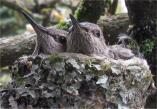
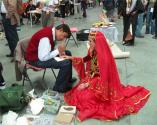
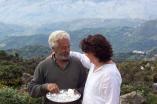

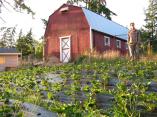
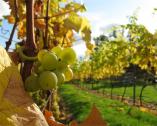
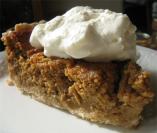
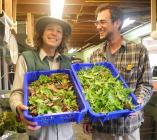


2 Responses to Corn and turkeys